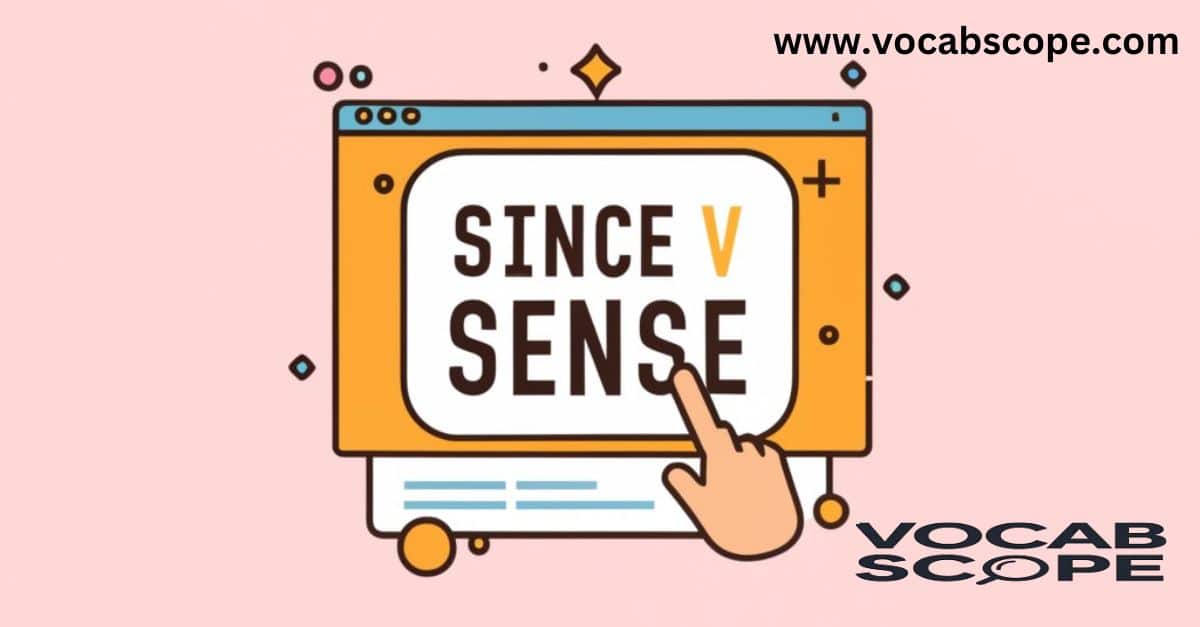The English language is rich with words that sound similar but hold vastly different meanings. Two such words, “since” vs “sense”, often confuse even native speakers. These homophones not only sound alike, but they also serve distinct functions in sentences. Understanding when to use each word can help you communicate more clearly and avoid embarrassing mistakes.
In this article, we’ll explore the definitions, uses, and nuances of “since” vs “sense.” We’ll provide examples in context, comparisons, and even substitutes for these words. By the end, you’ll have a comprehensive understanding of how to use them correctly.
Defining “Since” vs “Sense”

Before diving into detailed examples and usage, let’s first define these two words.
- Since can act as a conjunction, preposition, or adverb. It typically deals with time or cause.
- Sense, on the other hand, is used as both a noun and verb. It’s more related to perception, feelings, or understanding.
Now, let’s break these down further.
Since
“Since” wears many hats in the English language. It’s a versatile word that can play different roles in a sentence.
As a Conjunction:
“Since” is often used to indicate the cause or reason for something. It connects two ideas where one is the consequence of the other.
Example:
- Since you were late, we missed the opening speech.
In this sentence, “since” explains the reason for missing the speech. It’s not just about time; it establishes a cause-and-effect relationship.
As a Preposition:
When used as a preposition, “since” refers to the time that something started.
Example:
- I’ve been working here since 2015.
Here, “since” sets the starting point of an action (working) in time.
As an Adverb:
As an adverb, “since” modifies the action by showing the time that has passed between then and now.
Example:
- She moved away five years ago and I haven’t seen her since.
Sense
“Sense” is equally versatile, but in a completely different way. It’s all about perception, understanding, and feeling.
As a Noun:
The most common use of “sense” is as a noun, referring to our perception through the five physical senses—sight, sound, touch, taste, and smell—or our understanding of something.
Examples:
- He has a good sense of direction.
- I could sense the tension in the room.
In the first example, “sense” refers to a physical or instinctual ability. In the second, it refers to a perception or understanding of an emotional state.
As a Verb:
As a verb, “sense” means to perceive or become aware of something.
Example:
- She could sense the change in the atmosphere.
Here, “sense” is an action, describing how she becomes aware of something subtle, like an atmosphere or mood shift.
Since vs Sense

The words “since” and “sense” are frequently confused because they sound alike but serve very different purposes. “Since” deals with time or reason, while “sense” focuses on perception or understanding. By learning the differences, you can avoid common mistakes and use each word correctly.
“Since” as a Time Traveler (or Reason Giver)
“Since” acts like a time traveler or reason giver in sentences. It connects the starting point of an event with either a time reference or a cause. As a conjunction, it explains why something happened, while as a preposition or adverb, it indicates when something began.
Example (Time):
- I haven’t seen him since Monday.
Example (Reason):
- Since it’s raining, we’ll stay inside.
In both cases, “since” helps connect past actions to their consequences or causes.
“Sense” as Your Internal Compass
“Sense” serves as your internal compass, guiding you through perception and understanding. Whether it’s a gut feeling, physical sensation, or emotional perception, “sense” helps you navigate the world. As a noun, it refers to awareness through the five senses or a mental understanding. As a verb, it describes the act of perceiving or detecting something.
Example (Noun):
- His sense of smell is incredibly strong.
Example (Verb):
- She could sense the tension in the room.
In both uses, “sense” directs our awareness of the world around us.
Differences Between “Since” vs “Sense”
| Aspect | Since | Sense |
| Part of Speech | Conjunction, Preposition, Adverb | Noun, Verb |
| Main Usage | Refers to time or cause | Refers to perception or understanding |
| Example (Time) | I’ve been here since 9 AM. | – |
| Example (Reason) | Since you’re here, we can begin. | – |
| Example (Perception) | – | I could sense something was off. |
| Example (Understanding) | – | This explanation makes sense. |
Putting it into Practice: Makes Sense or Since?
When deciding whether to use “sense” or “since,” think about what you’re trying to express: time, reason, or perception. Let’s break it down with some examples:
- Makes sense: Use “sense” when referring to understanding or logic. For example, “Your explanation makes sense” means that what someone said is clear and understandable.
- Since: Use “since” when you’re talking about time or reason. For example, “I’ve been working here since 2020″ highlights a point in time, while “We stayed inside since it was raining” explains a reason.
Both words are important, but they serve different functions in a sentence. One connects time or cause, while the other relates to logic and perception. So, when you’re choosing between the two, ask yourself: are you talking about why or when something happened (since) or whether something is logical or perceived (sense)?
Bonus Tip: Avoiding Common Mistakes
A great way to remember the difference between “since” and “sense” is by focusing on their primary roles:
- “Since” usually deals with time or reason. Ask yourself, “Am I explaining when something happened or why something occurred?” If yes, “since” is the right choice.
- “Sense” revolves around perception or understanding. If you’re talking about feelings, logic, or physical sensations, then “sense” is your go-to word.
A simple rule is to think of “since” as the word that ties events to a timeline or cause, while “sense” helps you describe awareness and comprehension. This distinction will help you make the right choice every time!
Examples in Context since vs sence
Since (Time and Reason):
- I’ve known her since we were children.
(Indicates a point in time when their friendship began.) - Since it was getting late, we decided to leave the party early.
(Explains the reason for leaving early.) - The store has been open since 9 AM.
(Marks the starting time of the store’s operation.) - We’ve had a lot of rain since the weekend.
(Refers to a duration of time marked by weather events.) - Since he moved to the city, he’s made many new friends.
(Highlights a change that occurred after a specific event.) - I haven’t seen her since last summer.
(Indicates the last time they saw each other, marking a time gap.) - Since the company implemented new policies, employee satisfaction has increased.
(Shows cause and effect regarding policy changes.) - I’ve been on a diet since the start of the year.
(Specifies a time frame for a personal commitment.) - Since you’re already here, would you like to join us for dinner?
(Uses the word to explain a reason for the invitation.) - They’ve been working on this project since last month.
(Indicates the duration of time spent on the project.)
Sense (Understandings and Feelings):
- Perception: I can’t quite sense what’s bothering him; he seems off today.
- Understanding: After the lecture, it finally started to make sense to me.
- Intuition: She had a gut sense that the job interview would go well.
- Feeling: The warm breeze gave me a real sense of comfort.
- Awareness: I have a heightened sense of awareness when walking in a new neighborhood.
- Logical coherence: The plan sounded great on paper, but it lacked real sense in practice.
- Emotional understanding: He has a good sense of how to support his friends when they’re feeling down.
- Physical sensation: The sense of taste can vary greatly from person to person.
- Common sense: It’s just common sense to wear a helmet when riding a bike.
- Artistic perception: Her paintings evoke a sense of nostalgia that resonates with many viewers.
Words You Can Use in Place of “Since”
When Indicating Time:
- From:
I’ve been here from 9 AM. - After:
We left the party after it got late. - As of:
*As of last year, the policy has changed.* - Starting from:
*Starting from 2020, we began remote work.* - During:
I learned a lot during my internship.
When Indicating Reason:
- Because:
We decided to leave early because it was getting dark. - As:
I was worried as the weather turned bad. - Since (used again in a different context):
I didn’t attend since I was feeling unwell. - Due to:
The meeting was canceled due to scheduling conflicts. - Owing to:
*Owing to the traffic, I arrived late.*
Words You Can Use in Place of “Sense”
When Referring to Perception or Feeling:
- Feeling:
I have a strong feeling about this opportunity. - Perception:
Her perception of the situation helped us navigate the issue. - Awareness:
He has a heightened awareness of the surroundings. - Intuition:
Trust your intuition when making decisions. - Impression:
I got the impression that he was upset.
When Referring to Meaning or Understanding:
- Understanding:
His explanation gave me a better understanding of the topic. - Logic:
The logic behind her argument was sound. - Significance:
The significance of the study cannot be overlooked. - Meaning:
The meaning of his words resonated deeply with me. - Comprehension:
Her thorough comprehension of the material impressed the teacher.
Origins of “Since” vs “Sense”

Origins of “Since”
The word “since” has roots in Old English, derived from the word “síðan,” which means “from that time.” This word evolved from Proto-Germanic “síðana,” reflecting the concept of time and duration. Over centuries, “since” transitioned into Middle English, retaining its meaning related to time and causation.
It serves multiple functions in modern English:
- As a conjunction: It connects clauses, indicating a cause or time relation.
- As a preposition: It marks a specific point in time.
- As an adverb: It denotes a continuous action from a past moment to the present.
Origins of “Sense”
In contrast, “sense” originates from the Latin word “sensus,” meaning “feeling,” “perception,” or “thought.” This term is linked to the verb “sentire,” which means “to feel” or “to perceive.” The word made its way into Middle English from Old French “sens,” retaining its connection to human perception and understanding.
Today, “sense” can refer to:
- Physical perception: Such as sight, hearing, and touch.
- Emotional understanding: Relating to feelings and instincts.
- Intellectual comprehension: Pertaining to logic and reasoning.
A Final Look
By now, you should have a pretty good sense of when to use “since” and “sense.” Since we’ve covered so much ground, let’s recap:
- Use “since” when you’re talking about time or reasons.
- Use “sense” when you’re referring to feelings, perceptions, or understanding.
Remember, practice makes perfect. The more you use these words in context, the more natural it will become. Since you’ve made it to the end of this article, why not challenge yourself to use both words correctly in a sentence?
It makes sense to keep learning and improving your language skills. After all, since language is always evolving, there’s always something new to discover!

“Robert Henry is an experienced blogger with a passion for language and education. His insightful posts on Vocab Scope offer readers valuable tips on vocabulary and grammar. With a background in linguistics and a knack for clear, engaging writing, Robert is dedicated to helping others enhance their communication skills.”






